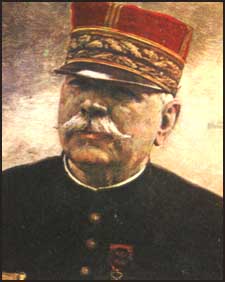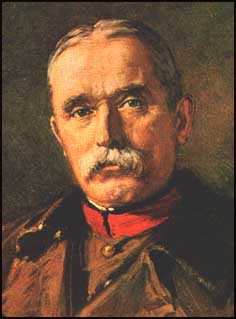 | ||
| The Generals Of 1914 |
| World War One - The War To End All Wars |

Joseph Joffre:
The French Plan XVII had been inherited by new Chief of Staff General Joseph Joffre, an unlikely man for the job. Joffre had been appointed to the post after his predecessor General Michel had been dismissed for criticizing Plan XVII and calling for the reorganization of the French Army, which made him very unpopular in the war council.   Moltek the Younger: The Germans top man was Helmuth von Moltke the Younger. He was the nephew of the famous general von Moltek the Elder and although he possessed a famous name he lacked the reassuring confidence of French general Joffre.   Sir John French: His full name with titles is Field Marshall Sir John Denton Pinkston French, Earl of Ypres, and in 1914 he was Britain's top man in charge of her expeditionary forces in France. Born in Ripple Vale, Kent in 1852. His first taste of military service came in 1866 when he joined the navy. French found that this was not at all to his liking, and so in 1874 he transferred to the army. The army life was just the thing for French and he was to have a long and successful career. His first tour of duty was from 1884-85 in the Sudan Campaign. But he really made a name for himself as a dashing cavalry officer in the Boer War. His next promotion of note was to Chief of Staff of the British Army in 1911. He served from 1912-13 as Chief of the Imperial General Staff. He was then given charge of the BEF in August 1914 and was sent to France. There was also a dark side to Sir John. His mood swings went from over-optimism to utter despair. As the campaign began, his mood was upbeat and lively, but after Mons and the retreat, his demeanor was extremely blue. He became too cautious, unwilling to help his French comrades if he felt his losses would be too great. He was speaking in terms of just surviving and not of winning. Field Marshall Sir Douglas Haig was not a fan of Sir John and was willing to say so to anyone who would listen. All these factors combined made it difficult for Sir John to function properly in these times of crisis. In his report on the Mons, Sir John somberly stated that he believed that the Battle of Mons would be typical of the way modern wars would be fought. Trenches and siege weapons would figure largely into the picture. Having been a product of the military school of attack, this was disheartening to French. The prospect of a long, drawn-out war was almost too much to bear. His mood became so black that in September of 1914, Lord Kitchner paid Sir John a visit and bluntly told him that England was to help France kick Germany off French soil, and that he was not to worry about losses but to do as he was told. By late September, the war of movement had bogged down into a war of defense. Once again, Sir John's mood changed to over-optimism. He again believed that a conclusive battle could be fought to bring the war to an end by 1915. Would Sir John be right? Would the war be over by 1915? Or would French's mood swings be his undoing?  |
|||||||||
|
|
|||||||||
|
|
|||||||||
| |||||||||